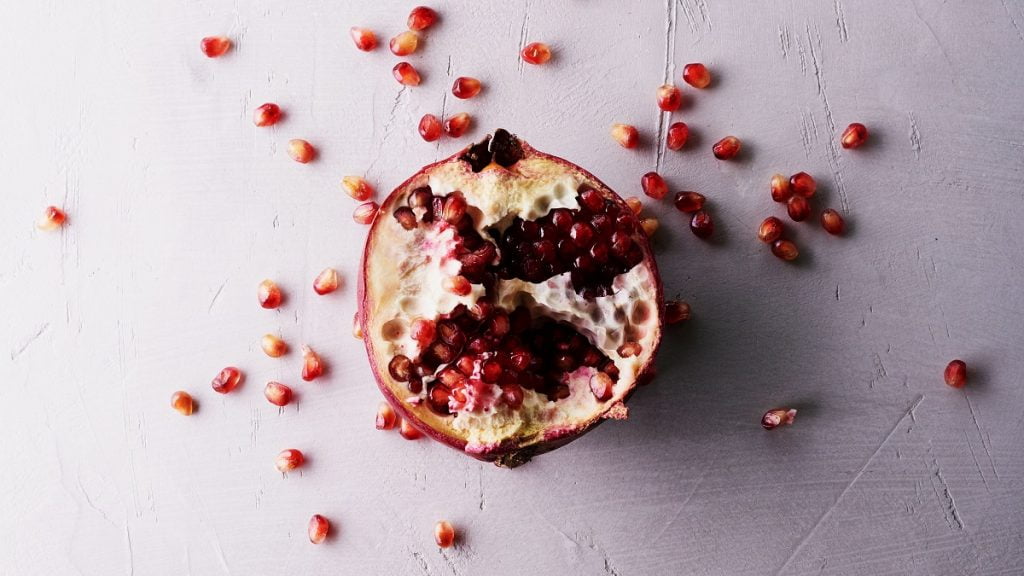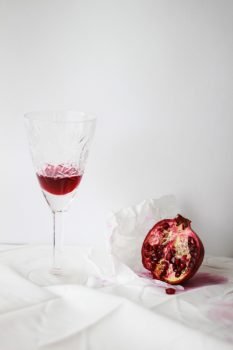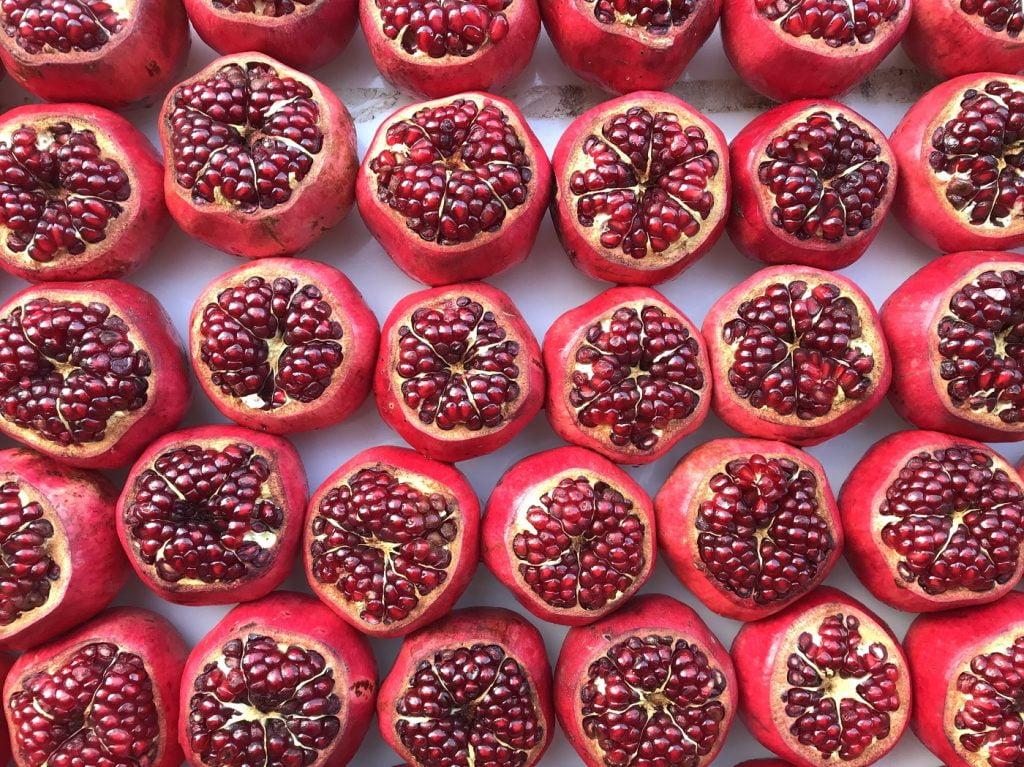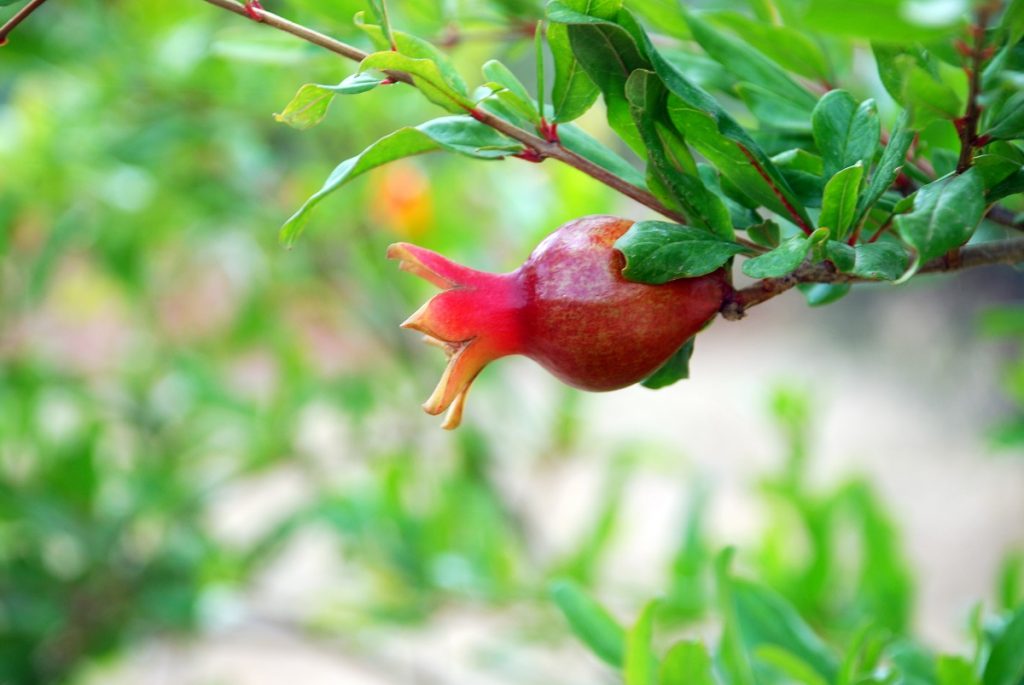It’s pomegranate season! This ruby-red super-fruit with a crown is one of the world’s most celebrated foods. Today’s crop varieties are said to have originated in Iran or Afghanistan, but they’ve been growing in Israel and the region for thousands of years.
Israeli horticultural researchers are known for introducing new types of pomegranates to the market, which are shipped to European clients. Of course, some of the local produce is kept in Israel: especially as the pomegranate (“rimon” in Hebrew) is one of the ritual foods for the Rosh Hashana holiday (Jewish New Year), which begins this weekend.
The pomegranate actually has numerous meanings and cultural references and is deemed a healthy – even medicinal – fruit. Already a pomegranate fan? Not one yet?
Here are 5 reasons to love the pomegranate:
They’re nutritional
Pomegranates may very well be the world’s most healthy fruits. These nutrient-rich ruby red orbs are bursting with vitamins, antioxidants, and minerals.
“Pomegranates have an amazing amount of Vitamin C, about a third of the recommended daily amount, and the fruit’s red-colored flesh contains high levels of antioxidants. As such, pomegranates have been shown to have anti-tumor properties and help ward off cancer, support a healthy heart, and lower blood pressure,” Yael Inbar, a health coach in Tel Aviv, tells NoCamels.
SEE ALSO: Scientists Discover Precise Method To Make Fruit Look And Taste Better
Scientific studies back up the health accolades and the pomegranate has shown to help prevent joint pain, arthritis, bacterial infections, help with stomach upsets, ward off the flu, lower cholesterol and so much more. This leathery-skinned fruit is a cure-all for numerous ailments.
A natural source of energy, pomegranates are so powerful that this fruit – which also boasts a rich source of potassium, folic acid, and fiber – has been found to pack three times the antioxidant levels of red wine or green tea.

Pomegranate. Photo by Charles Deluvio 🇵🇭🇨🇦 on Unsplash
And, as pomegranates also help with digestion, Inbar says there are “many ways to add pomegranates to your diet. Add the arils (flesh-covered seeds) to a vegetable or fruit salad, drink pomegranate juice, or use pomegranate molasses to fortify cooking.”
Pomegranate juice could reduce risk of premature birth and brain damage to fetuses
Israeli scientists recently announced that pomegranate juice could reduce the risk of premature birth and brain damage to fetuses.
Pomegranate juice has long been an item on pregnancy meal plans. Researchers from Rambam Health Care Campus and the Technion – Israel Institute of Technology are now giving two more reasons why this is so.
“Studies have shown that pomegranates are rich in polyphenols (a type of free-radical-neutralizing compounds), known to have strong antioxidant and anti-inflammatory effects that help protect against cardiovascular disease,” says Ron Beloosesky, Director of the Prenatal Ultrasound Unit in the Division of Obstetrics & Gynecology at Rambam.
“Because we know some causes of brain damage in fetuses are related to inflammatory processes, we thought to test if drinking pomegranate juice could help prevent infection and inflammation in the mother and thus reduce the risk of damaging the fetus.”

Pomegranate and juice. Photo by Eugenia Maximova on Unsplash
The researchers conducted their study on animal models, dividing them into three groups: (1) pregnant rats undergoing inflammatory processes; (2) pregnant rats who drank pomegranate juice for several days before undergoing inflammatory processes; and (3) a control group of pregnant rats that did not undergo inflammatory processes and did not drink pomegranate juice.
When researchers examined the group of pregnant rats experiencing an inflammatory process after receiving pomegranate juice for several days, they found a decrease in the levels of inflammation in the mothers and a significant reduction in signs of inflammation and injury to the brains of the fetuses.
The study was published in the American Journal of Obstetrics & Gynecology.
“Although this is a preliminary study, the results are very interesting,” says Beloosesky. “It seems that an accessible and inexpensive juice that can be found in any supermarket has a positive effect on a serious problem that harms mothers and their embryos.”
The pomegranate brings good luck
The pomegranate is bursting with symbolism and, depending on which culture or tradition being cited offers good luck, prosperity, eternal life, knowledge, and fertility.
It may just be the most sanctified fruit.
In Israel, markets are now teeming with this glorious fruit. ‘Tis not only the season for pomegranates but the Jewish New Year is here and it is customary to eat pomegranate arils at the holiday feast, and say, “May we be as full of commandments as the pomegranate is full of seeds.”
Sign up for our free weekly newsletter
SubscribeActually, the pomegranate has serious weight in Judaism. It is mentioned numerous times in Jewish texts with reference to fruitfulness and love. Some scholars say it was the pomegranate – not an apple – that tempted Eve in the Garden of Eden; the 12 spies are said to have brought a pomegranate back to Moses to show the “fertility” of the Land of Canaan; and it is often said that pomegranates have 613 seeds, to correspond with the 613 commandments in the Bible.
Ancient Egyptians used the pomegranate to combat infections, and they had a custom to bury their dead with the fruit as it symbolized eternal life, prosperity, and ambition.
In Greek mythology, this winter fruit figures prominently in the story of Persephone’s kidnapping by Hades. It symbolizes life, marriage and rebirth. And Greek goddess of love Aphrodite is often credited in Greek Mythology for planting the first pomegranate tree.
In modern Greece, the pomegranate symbolizes fertility, prosperity, regeneration and good luck. Smashing pomegranates is a fun New Year’s Eve custom in which Greek families throw the fruit at the front door of a home -the more seeds to scatter on the ground, the luckier the year will be. This smashing fruit custom is also common in traditional Greek weddings.
In Turkey and Armenia, it is also customary for brides to throw a pomegranate against a wall to ensure future children.
In China, the pomegranate represents fertility and offspring. In some Hindu traditions, the pomegranate symbolizes prosperity and fertility.
And in Christianity, the pomegranate is found in many religious paintings and an open pomegranate is said to represent the suffering and resurrection of Jesus.
Pomegranates are a natural aphrodisiac
With so many cultures designating the pomegranate as a symbol of fertility, it is no surprise that this crimson, juicy fruit is also cited as one of the fruit world’s natural aphrodisiacs.
In May, Cosmopolitan included the pomegranate in an article titled, 23 Aphrodisiac Foods That Can Affect Your Sex Drive.
The article cited that antioxidants found in the pomegranate “help deliver more blood flow to all areas of your body, including your genitals.” It also noted that “pomegranate juice may be helpful with erectile dysfunction.”
A Scottish study in 2012 found that pomegranate juice increased testosterone in both men and women, and increased sexual desire.
Classic and modern-day literature is also brimming with passages and sonnets featuring pomegranates as romantic or sensual symbols.
Pomegranates are fun to eat
The internet is filled with articles and videos on ways to eat pomegranates. Whether you prefer getting your hands dirty or hitting the skin of the fruit with a wooden spoon, the important thing is to enjoy the fruit.
It is fun to poke out the jewel-like seeds or scoop them straight into your mouth.
Chewing pomegranate seeds is a mouthwatering adventure every time: break the fruit sac covering the seed with your teeth to release the sweet and tangy juice.
Pomegranate fans are divided into those who eat the inner seed while others spit it out. Some people use pomegranate seeds as a fine motor development skill snack for toddlers still learning to master their hand-eye coordination and pincer skills. So cute!
SEE ALSO: Edible Insects Are The Future Of Food, Says Israeli Startup Flying Spark
So, what’s the best way to eat a pomegranate? There isn’t one. Drink the juice or chew the seeds – it doesn’t matter. Just make sure to enjoy.
Viva Sarah Press is a journalist and speaker. She writes and talks about the creativity and innovation taking place in Israel and beyond. www.vivaspress.com
Related posts

Israeli Medical Technologies That Could Change The World

Harnessing Our Own Bodies For Side Effect-Free Weight Loss

Missing Protein Could Unlock Treatment For Aggressive Lung Cancer





Facebook comments